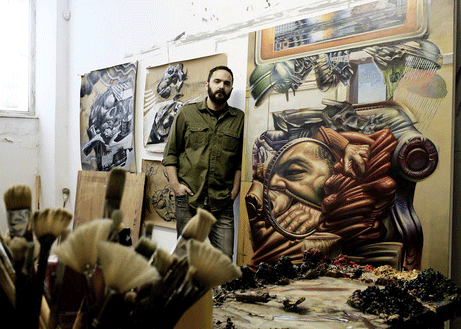By Pari Spinou
The young painter, inquisitive and creative, takes part in the international SWAB art fair in Barcelona presenting his new material.
Many new artists constantly complain and grumble about the consequences of the economic crisis. Fortunately, Nikos Moschos winks cunningly at it. He is self-confident, he compensates for all the misfortune with the satisfaction brought by creativity,
he remains an inquisitive and critical mind.
He is currently part of the international SWAB art fair in Barcelona (2-5/10), showcasing new work, with Alma Gallery, making a symbolic "leap" - alma, in Greek – abroad.

"I managed to make a living exclusively by painting from early on", the 35-year-old painter tells us right before he catches the plane. "This is mainly, I think, due to my dedication and "stubbornness". I'm happy to be tormented by the implementation of my ideas. I am compensated by creative thinking, the joy of creating something new, the surprise of something random. Recognition and commercial success are surely an added bonus that gives me encouragement, however, compared to achieving my goals inside my workshop, they look more like the dessert in a meal."
His work, almost always autobiographical, intrigues, annoys, goes against the norm, looks like a game pushing the rules and the boundaries. The pieces exhibited in Barcelona are an evolution of his two previous series presented in 2012 and 2013, titled "The Marriage of Flesh and Machine". The predominant element in his paintings is collisions: disproportionate human limbs crushed by machines, trees or buildings, creating unexpected situations, often emotionally charged.
The surprising angles, the distortions, as well as the implied stylized shapes stem from expressionism, comics and byzantine iconography. Ancient remnants of a glorious past are intertwined with unworthy fragments of the present. "Human monuments lacking all nobility and superiority" is his description of them, "a human conquered by their animal instincts and incessant hunger, who became one with iron and stone but is still more vulnerable than ever."
Technology is present in Nikos Moschos' compositions, however, it is not a tool for his work. "My relationship with it is minimal; I use technology just as a means to facilitate my everyday life. I don't find it necessary to be constantly online, I don't know how to use photoshop etc. I'm not against technology or trying to demonize it, it simply doesn't seem interesting enough for me", he tells us. "It can't be denied that this technological race has provided humanity with extremely useful solutions. Robotics in the medical field, for instance, made lifesaving operations a reality. On the other hand, there is a rapid change of products, using communication as a pretext, based on meaningless and disorienting arguments. In the midst of this spending spree, technology has become a kind of fetish with self-referential elements. Here, man looks a bit like Pygmalion who blindly follows his great love."
He also comments on the overused expression "Creating during the crisis". "To a lot of people it sounds as romantic as the title of the famous Márquez novel "Love in the time of Cholera". Unfortunately, the situation was sickly for as long as I can remember; it's not a recent phenomenon. As far as creators are concerned, some stand "frozen" in the middle of this tide while others take a dive and reel in big fish. The buying public has shrunk, and more than a few have reconsidered their views on what constitutes art and what is really valuable. Artists and galleries alike have come to understand the urgent need to turn to a wider audience. This extroversion concerns not only the commercial aspect, but also the circulation of ideas from the artists themselves, as the Greek art scene can be seen, with very few exceptions, as isolated. The state should have a more prominent role in this "opening up" and finally place the foundations for the creation of infrastructures and institutions which will motivate and promote the modern Greek production."